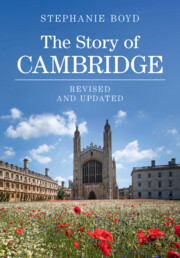Book contents
- The Story of Cambridge
- Dedication
- The Story of Cambridge
- Copyright page
- Contents
- Cambridge: a Famous City
- 1 Prehistoric Cam Valley
- 2 Invaders and Settlers
- 3 Medieval Cambridge
- 4 Tudor Cambridge
- 5 The Seventeenth and Eighteenth Centuries
- 6 Victorian and Edwardian Cambridge
- 7 Cambridge at War
- 8 The Modern City
- Acknowledgements
- Index
5 - The Seventeenth and Eighteenth Centuries
Published online by Cambridge University Press: 23 May 2023
- The Story of Cambridge
- Dedication
- The Story of Cambridge
- Copyright page
- Contents
- Cambridge: a Famous City
- 1 Prehistoric Cam Valley
- 2 Invaders and Settlers
- 3 Medieval Cambridge
- 4 Tudor Cambridge
- 5 The Seventeenth and Eighteenth Centuries
- 6 Victorian and Edwardian Cambridge
- 7 Cambridge at War
- 8 The Modern City
- Acknowledgements
- Index
Summary
Fortified as a Parliamentarian stronghold under Oliver Cromwell, Cambridge emerged from the English Civil War intact, and flourished under the Restoration of Charles II in 1660. A great age of science and architecture at Cambridge followed, inspired by Trinity fellow Isaac Newton and architect-mathematician Christopher Wren. Stephanie Boyd explains why the building of college courts, chapels and libraries boomed in this period, and classical masterpieces such as the Wren Library at Trinity sprung up. Comparison is drawn between the fine Cambridge colleges and the squalor of the town, and the impact of the Great Plague on townspeople and scholars. The contributions of individuals such as Francis Bacon and Pepys are included, along with local businessman Thomas Hobson, originator of both fresh water to the town from Nine Wells and the expression ‘Hobson’s Choice’.
Keywords
- Type
- Chapter
- Information
- The Story of Cambridge , pp. 77 - 95Publisher: Cambridge University PressPrint publication year: 2023

